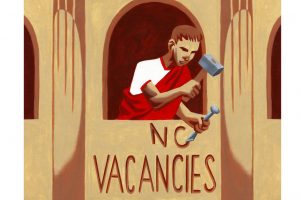
ILLUSTRATION: THOMAS FUCHS
May is a merry month, not least because it heralds the start of tourist season. That’s good news for a visitor-friendly country like the U.S., where tourism has generated nearly $1.6 trillion of annual economic output in recent years.
Orlando, Fla., and New York are the two most popular destinations, though New York claims to have the better-quality hotels. Whether or not that’s true, it’s a sales pitch that has been used for at least 4,000 years. Tourism and its adjunct, the hotel industry, are as old as civilization. When the Sumerian King Shulgi of Ur (circa 2094-2047 B.C.) wanted to boast about his achievements, the list of accomplishments included having improved the roads in and out of Ur and “built there lodging houses…and installed in those places experienced men. Whichever direction one comes from…the traveler who reaches nightfall on the road can seek haven there as in a well-built city.” Continue reading…






